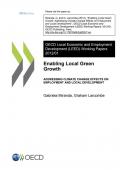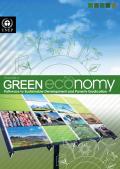This paper on Green Innovation in Tourism Services seeks to analyse the role of green innovation in the transition of tourism enterprises (hotels, restaurants, travel agencies, tour operators) to a green economy; how green innovation in tourism is supported in OECD countries (e.g. specific structures, mechanisms and good practices); and what can be done to accelerate the diffusion of green innovation in the sector. The paper provides a range of potential areas of policy focus to improve diffusion, strengthen markets and change consumer attitudes to green innovation in the tourism sector.
In the chapter “Competitiveness, Jobs, and Green Growth: A “Glocal” Model,” Geoffrey Lipman of Greenearth.travel and Victoria University Melbourne, with Terry Delacy and Paul Whitelaw of Victoria University Melbourne, present the conceptual and operational research led by the Victoria University Centre for Tourism and Services Research to create a system where destinations can identify optimum green growth development scenarios for Travel & Tourism, to sustainably build wealth and create jobs. The authors present a conceptual global framework for green growth and travelism and show how adjusting it to the local level allowed for a major strategic visioning effort (conducted in Bali Indonesia in 2012), which has resulted in the Green Growth 2050 Roadmap.
Three different sets of approaches to understanding behaviour with respect to sustainable tourism mobility and consumption are identified in this paper: the utilitarian, social/psychological and the systems of provision/institutional approach. Each is based on different sets of assumptions on the factors that affect consumer sustainability behaviour. These assumptions not only affect the selection of policy tools to change behaviours but are also related to different modes of governance. Assumptions with respect to human behaviour and behavioural change and modes of intervention and governance are interrelated and mutually reinforcing and act as policy paradigms. Failure to recognise the importance of social structures in affecting behaviour has created a path dependency in which solutions to sustainable tourism mobility are only accepted within the dominant governance and behavioural paradigm. Other policy options and academic research that identify structures and institutions in systems of provision as a sustainability problem that requires non-market intervention and/or significant system change are regarded as marginal to the policy process or are ignored.


The Green Economy Report is compiled by UNEP’s Green Economy Initiative in collaboration with economists and experts worldwide. It demonstrates that the greening of economies is not generally a drag on growth but rather a new engine of growth; that it is a net generator of decent jobs, and that it is also a vital strategy for the elimination of persistent poverty. The report also seeks to motivate policy makers to create the enabling conditions for increased investments in a transition to a green economy.
The report includes chapters on the following areas:
- Agriculture
- Fisheries
- Water
- Forests
- Renewable Energy
- Manufacturing
- Waste
- Buildings
- Transport
- Tourism
- Cities
- Modelling
- Finance
